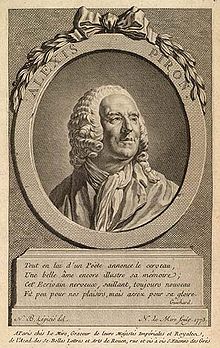Alexis Piron
Alexis Piron (born July 9, 1689 in Dijon , † January 21, 1773 in Paris ) was a French lawyer and writer.
Life
Piron was the son of a Burgundian apothecary and dialect poet of Christmas carols . According to the family resolution, Piron should study theology, but he prevailed and took law at the University of Besançon . He then practiced as a lawyer in that city. But around 1718 he lost office and honor because of "an obscene poem", his Ode à Priape .
From the following year he lived and worked in Paris. There he made friends with Denis Diderot and Alain Lesage , whom he met at Café Procope . He also made the acquaintance of Prosper Jolyot Crébillon , who also came from Dijon. He encouraged and supported him in writing. Through Crébillon he got the opportunity to write for the Comédie-Française . From the beginning, Voltaire respected and praised Piron's literary work. A collaboration between Alexis Piron and the then little-known composer Jean-Philippe Rameau began in 1723 . He composed incidental music for four of Piron's comedies, beginning with L'Endriague . However, none of these compositions have survived.
In 1750 Piron ran for the Académie française , but withdrew his candidacy. In addition to poetry and comedies, epigrams in particular dominate his work. In the same year, Piron sent the influential literary critic Pierre François Guyot Desfontaines a not very flattering epigram every day for 50 days. He wrote La Fréronade against an employee of Desfontaines Élie Catherine Fréron . But Piron also wrote extremely snappy sentences against Jean-François de La Harpe , Jean-François Marmontel and Voltaire .

Piron achieved the greatest success with La Métromanie ( The poetic family, or the addiction to rhymes ). The verse comedy premiered on January 10, 1738. Piron had portrayed himself as a hero. Voltaire describes this work as the best comedy after Molière and creates the term "pironmania" for this addiction .
The date of Piron's marriage to Mademoiselle le Bar , a maid of Madame de Mimeure , is not known; however, the wife's year of death is 1751.
1753 Piron ran again for a seat in the academy, but the veto of Louis XV. prevented his admission for good. The Church had remembered the Priapic Ode and exercised its influence. As compensation, Madame de Pompadour gave Piron a pension of over 1,000 livres .
In his later work, Piron turned more and more to religious poetry. Alexis Piron went blind in the last few years of his life and died at the age of 84.
Works
- Ode to Priape (1718)
- Arlequin-Deucalion (1722)
- Le Caprice (1724) Comical opera in one act
- Calliste (1730)
- L'école des pères (1728)
- Fernand Cortez où Montezume (1744)
- La Fréronade (1750)
- Gustave Wasa (1733) tragedy
- La métromanie (1738)
literature
- Barbotte, Marcel: Piron, qui ne fut rien… Editions de Saint-Seine-l'Abbaye, Saint-Seine-l'Abbaye (1984) ISBN 2-8670-1026-8
- Chaponnière, Paul: Piron: sa vie et son œuvre. Jullien, Geneve (1910)
- Chaponnière, Paul: La vie joyeuse de Piron. Mercure de Paris, Paris (1935)
Web links
- Literature by and about Alexis Piron in the catalog of the German National Library
| personal data | |
|---|---|
| SURNAME | Piron, Alexis |
| BRIEF DESCRIPTION | French lawyer and writer |
| DATE OF BIRTH | July 9, 1689 |
| PLACE OF BIRTH | Dijon |
| DATE OF DEATH | January 21, 1773 |
| Place of death | Paris |

